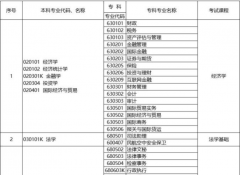


河南省专升本英语常用词汇辨析(一)(
31. common, ordinary, average
这组形容词均含有“普通的”意思。 common 意指平平常常,没有独特、引人注目之处。如: It is a common error for beginners. 初学者常犯这种错误。 ordinary 与 common 意思相近,表示“平凡,普通”。如: He is not a hero, just an ordinary man. 他不是英雄,只是个普通人。 average 表示某种平均标准,强调具有典型性,代表性。如: The average temperature is higher this year than last. 今年的平均气温比去年高。
32. compare to, compare with
compare to 表示“将……比作”,指两项事物相比。如:The writer compares his lover to a rose. 作者把他的情人比作玫瑰花。compare with 表示通过两物对照、比较找出差异之处或相似之处。如:Compare your translation with the model translation. 将你的译文和范文加以比较。
33. continual, continuous, constant
这组形容词均可表示“持续的”。continual 指连续的,但中间有间断。如:He suffered from continual attacks of toothache. 他时常牙痛。 continuous 连续不断,中间无间断。如: This continuous hot weather is very bad for the patients. 持续的高温天气对病人很不利。 constant 强调不变、恒定与持久。如: The birth rate in some countries is constant. 一些国家的婴儿出生率一直保持稳定。
34. considerate, considerable
considerate (of sb. to do sth.)体谅人的、体贴人的
considerable 相当大的、相当多的
35. contain, include, comprise, cover
contain 包含,容纳,指大的物体内包含或容纳不同的东西
include 包括,包含,指包括、包含的人或物是整体的一部分
comprise 包括、包含,所包含的东西是组成整体的各个部分
cover 包括、包罗,所指的不一定是具体数量,指一个范畴
36. correct, accurate, exact
这组形容词均表示“正确的”。correct 指正确的,真实的。如:He used correct English in his article, but his facts were incorrect. 他文章里的英语使用得很准确,但引用的事实是不确切的。accurate 指由于细心而准确地使某事符合事实。如:He gave us an accurate report of the accident. 他向我们准确地描述了事故的发生。exact 指不多不少,确切地与事实或标准相符。如:What is the exact size of the table? 桌子的确切尺寸是多少?
37. create, invent, discover
这组动词都可作“创造,发明”解。create“创造”,强调由无到有,常指文学艺术创作,也可指制造的产品等。如:The poets create beauty. 诗人创造美。invent “发明”,表示发明创造出先前没有见过的新东西,强调头创性以及经过反复试验后方成功。如:Bell invented the telephone in 1876. 贝尔于1876年发明了电话。discover “发现”,侧重表示经过探索、研究或实验后发现了原已存在但尚未被人们认识或了解的东西。如:Columbus discovered America in 1492. 哥伦布于1492年发现了美洲。
38. dear, expensive, valuable
这组形容词均含有“昂贵的,贵重的”意思。dear 表示“贵重的,相当值钱的”。如:Diamonds are dear.钻石很贵重。expensive 表示“昂贵的,买不起的”,超过物品本身的价值和买者购买能力的。如:The book is too expensive for me. 那书太贵了,我买不起。valuable 表示“宝贵的,有价值的”。如:We have taken much of your valuable time. 我们已占用了你不少宝贵的时间。
39. damage, harm, hurt, injure
damage 损坏,多指对物的破坏
harm 伤害,着重强调伤害引起的病苦、悲伤
hurt 使……受伤,指精神或肉体的伤害,含有强烈的疼痛意味
injure 伤害,损害(感情),毁坏(名誉)
40. decline, refuse, reject, deny
decline 拒绝、谢绝,较客气,委婉地拒绝
refuse 坚决、果断地拒绝,不肯
reject 拒绝,抵制,语气最强
deny 拒绝、不给(所请求或需要之物)。另一常见的意义是:否认、不承认
-
报考二建需要社保吗
现代华西教育
-
学历提升教育机构排的状
现代华西教育
-
在职人员有必要学历提升
现代华西教育
-
提历报考什么专业比较好
现代华西教育






